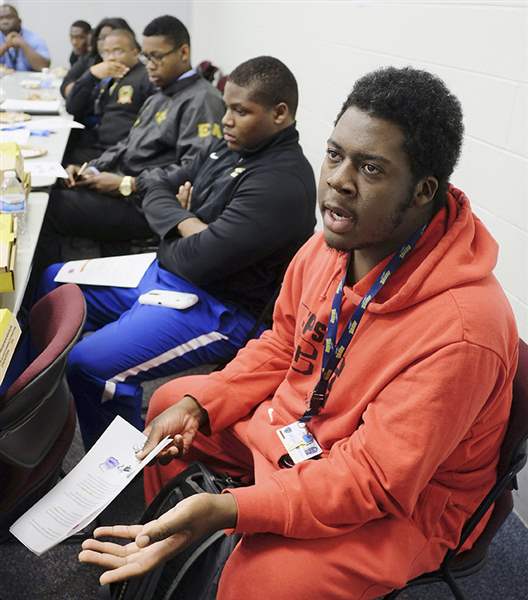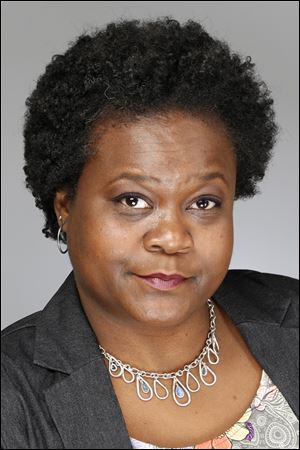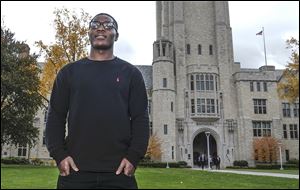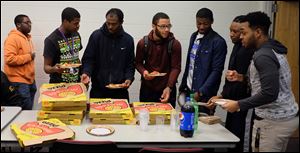
COMMENTARY
Brothers on the Rise at UT gives lifeline to minorities on campus
Mentoring group tackles disparity in dropout rates
11/2/2014
University of Toledo student Khalil Taylor speaks during a meeting with Brothers on the Rise, a group of UT faculty and staff who are mentoring minority students in the hopes of improving retention rates.
THE BLADE/JEREMY WADSWORTH
Buy This Image

Hackney.
This fall, 18-year-old Mark Pearson came to the University of Toledo from Detroit’s Cody High School on a mission: As a freshman walk-on football player, he would work to improve his grades and earn a spot on the Rockets’ roster. His dream was jeopardized, just three weeks into the school year, when he got into a fight with another student on campus.

University of Toledo student Mark Pearson was given a second chance after facing expulsion for fighting on campus. The UT student conduct hearing board allowed Mr. Pearson to stay as long as he participated in the Brothers on the Rise program.
Punches flew and landed, as did obscenity-laced name calling. The altercation was about a girl, inflated egos, and the inability of these two young men — friends who lived on the same floor in the same dorm — to resolve conflict in a mature manner. Students who witnessed the fight recorded it. The video went viral on campus, and their resident assistant was put on notice that the beef had not been quashed, although they stopped the fight in fear that campus police would arrive.
Just weeks after enrolling at UT, Mr. Pearson appeared to be on his way back home. He faced expulsion from the university for violating the student code of conduct, which prohibits any physical or verbal abuse that threatens or endangers the safety of another person. He was interviewed about the fight by university officials. He explained that he was simply defending himself.

University of Toledo student Khalil Taylor speaks during a meeting with Brothers on the Rise, a group of UT faculty and staff who are mentoring minority students in the hopes of improving retention rates.
“It was hard to tell my mom,” Mr. Pearson told me of the fight and impending punishment. “I was feeling even more disappointed in myself. A lot of people in my family didn’t go to college, and I felt that I was letting everybody down. This was my chance and I blew it.”
But a UT student conduct hearing board gave Mr. Pearson a second chance, with a caveat: He could remain enrolled if he agreed to be mentored by a group of faculty, staff, and graduate students called Brothers on the Rise. Mr. Pearson didn’t know it yet, but he had just been handed a lifeline.
Brothers on the Rise works to foster a culture of academic and personal success for UT’s African-American and Latino male students because their retention and graduation rates have been persistently low. These men — black and Latino faculty, staff, and graduate students themselves — work outside of the classroom to offer support to those minorities who are underrepresented on campus — and most in danger of dropping out.
A troubling slump
College enrollment rates among African-American and Latino students have steadily increased nationally, but UT remains in a troubling slump for those actually graduating within six years, the standard measure in which four-year institutions track degree completion. The numbers for male minorities are especially startling. Last year, 18 percent of UT’s African-American male students graduated after six years, compared with 51 percent of their white counterparts. Latino men fared a bit better, with 39 percent earning their degrees in the same time frame.

And those are the students who survive to become seniors. The most recent retention rates — students who enrolled in fall classes in 2012 and returned for fall 2013 — show gaps among white and minority students. Among African-American male students, 38 percent returned to UT, compared with 68 percent of Latinos and 76 percent of white male students.
“This is nothing short of a crisis — we lose kids all the time who want to be here, but don’t know how to be here,” said Willie McKether, a UT professor of anthropology and president of Brothers on the Rise. “We see ourselves in these students, and we have an overwhelming sense of obligation to do something. When you see guys on campus one semester and you don’t see them the next, it hurts. It means that we didn’t reach them fast enough.”
Need for support
Brothers on the Rise, founded in the fall of 2011, has about a dozen active faculty volunteers. The group holds monthly discussion sessions with minority students — a few women attend — to have “real talk,” frank conversations where they can voice their problems or trepidation about what it means to be an African-American or Latino college student. Topics range from improving study habits to displaying proper conduct when stopped by a police officer to social media etiquette.
Members of Brothers on the Rise also created what they call “brotherhood circles” in an effort to catch students who may be slipping through the cracks. Each member is assigned to three or four students for whom they are responsible for maintaining weekly contact. They can call, text, or invite the student to lunch or office hours for periodic updates.
The university does a laudable service by opening its doors to Ohio residents and some neighbors in Michigan who might have little chance of earning a college degree elsewhere. But that access means nothing if a support system is not in place to help those students. If African-American and Latino students don’t receive college degrees, this country will continue to experience long-term inequities in social and economic mobility.
It might be difficult to understand why these young men need such support, especially if you’re not walking in their shoes. But college can be an intimidating place for minority students, and their issues are complex. Oftentimes, these students are adjusting to being a part of a predominantly white academic setting and have trouble fitting in on campus. There are financial obligations that can be overwhelming, particularly if they come from low-income households.
These students can also come from underperforming urban school districts, where their academic preparedness, including study habits and time-management skills, are not on par with their peers. First-generation college students don’t have family members to tell them what it takes to succeed at a university. And often they don’t seek help from advisers or find university resources, such as math tutoring or the writing lab, before they’ve already stumbled academically.
There are support groups similar to Brothers on the Rise popping up all over the country, and rightfully so. Universities are funding summer bridge programs that help students learn what it takes to be a college student before the first day of classes. These are institutional programs, not, however well-intended, faculty-driven safety nets.
Ohio State University, for example, sponsors an early-arrival program that has yielded fantastic results in minority retention and graduation rates. These programs are working, but it starts with a financial commitment from the top. I am amazed by what Brothers on the Rise is doing for our students here, but it shouldn’t be on them to fix what’s broken at the university. It’s time for UT to shift away from its desire to increase student enrollment, and instead focus on degree completion for those who are already there.

“Sometimes retention is looked at as the job of this unit, or this division, but it has to be looked at as the job of everyone connected to the university, because all of the students at the institution are valuable,” David Young, director of UT’s Office of Excellence & Multicultural Student Success and director of programming for Brothers on the Rise, told me.
A turnaround
Sometimes, all it takes is seeing the value in a person, especially when it seems easier to overlook them. Sometimes they don’t know how much they need a helping hand.

Angelo Smith, fourth from left, is already receiving graduate assistantship job offers, though he’s still completing undergraduate studies.
Angelo Smith, 22, a UT student from Detroit, is a senior majoring in public health. He is a Brothers on the Rise participant who now helps younger students navigate the university. Mr. Smith is a shining example of what can happen when someone takes the time to invest in a young, black man by encouraging him to invest in himself. He’s already receiving graduate assistantship job offers, though he’s still completing undergraduate studies. He is why we should all care about UT’s retention and graduation rates.
“I just want to be a successful coach and mentor for the next group of them — that’s the brotherhood,” he said. “I feel the impact because the group made an effort for me, and it is paying dividends. It’s my turn to pay it forward.”
Mr. Smith, who attended Saginaw Valley State University as a freshman in 2010, was suspended from the university — once in the spring of his first year, and permanently in the fall of his second year. He characterizes his behavior as lacking guidance, dumb, and immature, from fighting to sneaking his girlfriend into his dorm room to spend the night and getting caught. The final offense for him was being caught on camera in the dorms despite being banned from them.
He arrived at UT in fall 2012, after a stint back home in community college, ready for a new beginning. Brothers on the Rise helped serve as a gateway. He said the interaction helped him realize that an absentee father who was not around to teach him how to conduct himself as a man, and the feelings of racial isolation at a predominantly white institution, were deep-seated issues he needed to address.
“I had an epiphany from it,” said Mr. Smith, who expects to graduate with honors in December, 2015. “And seeing that there are people who look like you, who really care about you, who take the time to reach out to young men, to make sure we are progressing, it’s uplifting.”
Mr. Smith plans to pursue a master’s degree in public health or nursing at UT. He’s also considering a master’s degree in biomedical sciences, which would enable him to become a physician’s assistant. This man is mature, focused, and well mannered. He’s hungry for success, and has a deep desire to bring along others with him. Yet he could have lost it all, if not for a little help from his brothers.
Suzette Hackney is an editorial writer and columnist for The Blade.
Contact her at shackney@theblade.com or 419-724-6018, or follow her on Twitter @suzyscribe.